How Preston and Chorley hospital staff will help their patients make the best of Christmas
and live on Freeview channel 276
Nowhere more so is that true than for those who find themselves hospitalised over Christmas - whether with the virus itself or as a result of any other medical misfortune.
While hospital is never the best place to spend the festive season, the stoic efforts of staff to bring some Christmas cheer to the patients in their care at this time of year can usually be relied upon to lighten spirits - if only a little.
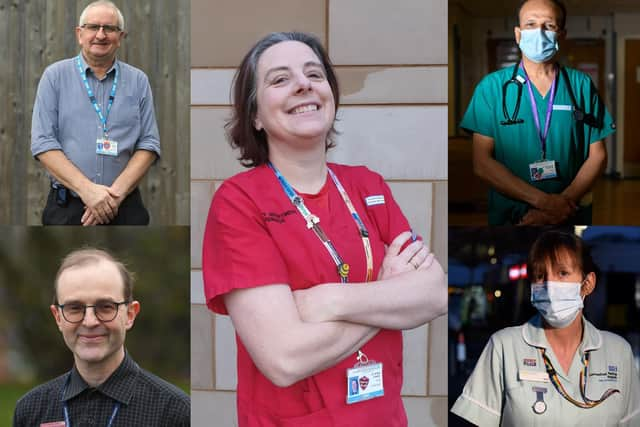

Advertisement
Hide AdAdvertisement
Hide AdYet like so many other once simple things in life, dispensing kindness and compassion in a hospital environment is no longer the uncomplicated gesture it was before the pandemic - with friendly faces now hidden behind masks and the distribution of tasty treats bound up with considerations about infection control.
Against that backdrop - and ongoing restrictions on visitor numbers and durations - staff at the Royal Preston and Chorley and South Ribble Hospital will take on the mantle not only of keeping their patients safe and well cared for, but also as happy as they can be given that fate has conspired to put them in a hospital bed over Christmas.
It is a challenge in which the NHS has, regrettably, got past experience - this being the second Christmas with Covid acting as the most unwanted of guests during the festive period. And it is one which those working at Lancashire Teaching Hospitals say they will rise to in the forthcoming days - just as they have had to all year round.
The Post has spoken to five staff who either know for certain that they will be walking the hospital corridors on Christmas Day - or can be called upon to cancel their own Christmas plans at a moment’s notice and come in to support their colleagues and look after patients.
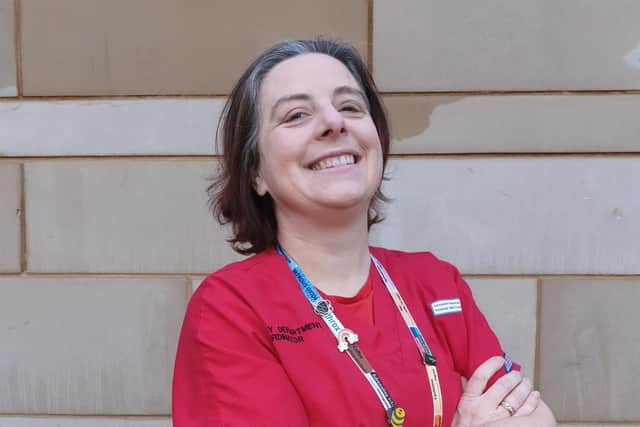

Advertisement
Hide AdAdvertisement
Hide AdTHE A&E DOCTOR: ‘Sick people don't want bad news delivered in a Santa suit’
Dr. Kirsty Challen, Consultant in Emergency Medicine, Royal Preston
It is a perhaps obvious fact that the nature of their work means hospitals need to function on Christmas Day in much the same way as they do on any other. That is maybe most evident in the accident and emergency department, where those often most desperately in need of help do not stop coming through the door simply because of a date on the calendar.
Staff still try their best to bring something of the season to those in a position to appreciate it. However, according to Dr. Kirsty Challen, who will be leading the department at the Royal Preston on what, for those lucky enough to be at home, will be ‘the big day’, there is a balance to be struck.
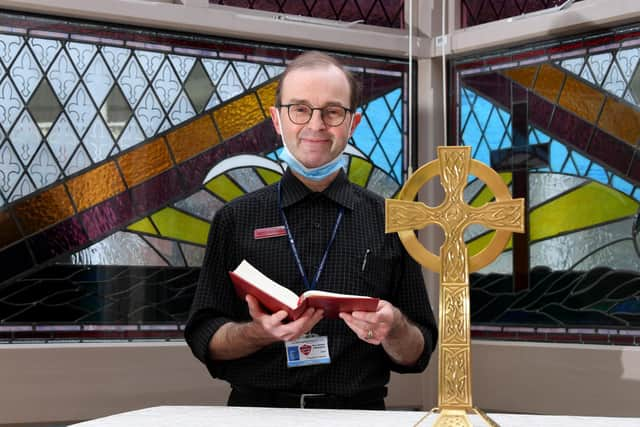

Advertisement
Hide AdAdvertisement
Hide Ad“You do want to make it special, especially if you have got kids in the department. But you have to remember that, whatever day of the year it is, the day they meet me is possibly the worst day of many people’s lives.
“If that is also Christmas Day, the last thing they need is some awful news from me [being delivered] in flashing reindeer earrings and a Santa suit. We don't want to make it worse for people who do have to come and see us.
“And, sadly, with Covid - unless there are some very specific circumstances - we are not able to have relatives in the department. So it's going to be quite lonely for people, stuck there on their own.
“Obviously, the team is going to be working really hard - above and beyond how hard my team always works - just to make people feel valued and cared for.”
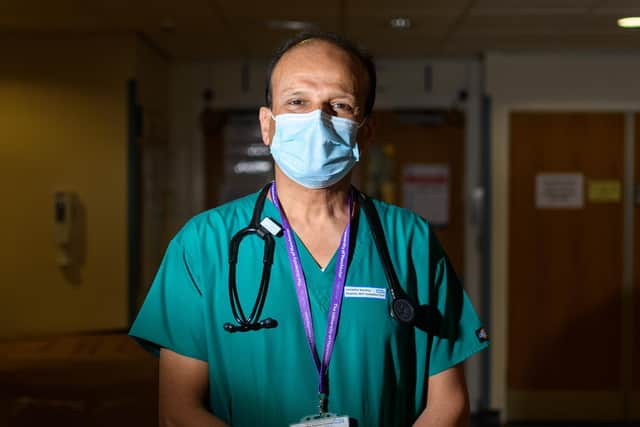

Advertisement
Hide AdAdvertisement
Hide AdDr. Challen says that A&E can be a little quieter than normal on Christmas Day, because people are generally not doing the sometimes risky jobs or chores that can land them in hospital.
While she fully subscribes to the well-worn appeal to the public only to use the services of departments like hers in a genuine emergency, she says she has “faith in the common sense and judgement of the British public to make the right decision” about whether to turn up at the front door.
“If they need us, then they need us - and that’s what we’re there for. These days, if you're not with your family, there is less social support around making those decisions and it gets a lot harder for people.
“The [health] service is quite complicated in terms of what’s open and when - and we completely understand that people can find [it] a little bit hard to navigate. If anyone is not sure, either 111 online or on the phone are very helpful in getting [people] to the right service in the right timespan.
Advertisement
Hide AdAdvertisement
Hide Ad“Please be sensible over Christmas, don't drink too much, don’t go out if you have Covid symptoms and please get vaccinated. They are incredibly important messages to us at the moment, because we don't need more people getting ill, [as] we are up to the gunnels with the people we already have.”
With an anaesthetist for a husband, Dr. Challen says her family is used to celebrating their Christmas on Boxing Day or even beyond - but she says her colleagues make a good familial substitute.
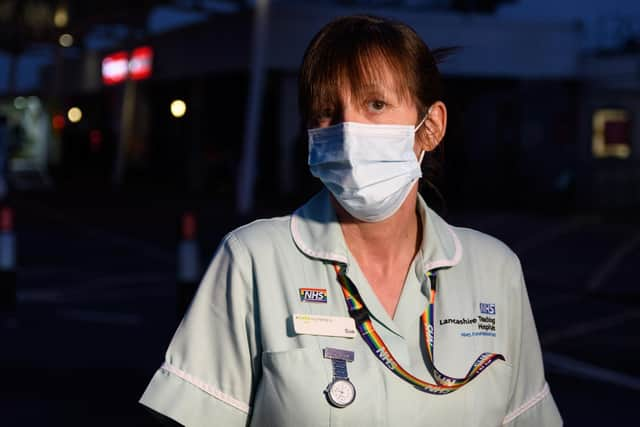

“We see sometimes the best, but often the worst of everybody’s lives - and the way that that bonds teams all across the professions and the grades of staff and makes the team stick together, is one of the best things [about] working in emergency medicine. [For us], even if you can't be with your [own] family on Christmas Day, you can at least be with your work family.”
THE CHAPLAIN: ‘What happens to people at Christmas affects them for evermore’
Advertisement
Hide AdAdvertisement
Hide AdReverend Simon Gilbertson, Chaplain, Chorley and South Ribble Hospital
Last Christmas, Reverend Simon Gilbertson’s role of bringing comfort to the sickest of patients at Chorley and South Ribble Hospital was a duty he discharged under the shadow cast by Covid - with the virus also often being the cause of his busyness.
Donning full personal protective equipment, he was by the side of stricken virus patients when their loved ones were not allowed to be.
“It was a very difficult time. Technology is a wonderful thing and we have been able to do many wonderful things with [it], but sometimes people just want that human contact - and if that's what they want, that’s where we will go.
Advertisement
Hide AdAdvertisement
Hide Ad“It comes back to that message of God coming to be with his people - right next to them, in the mess with them. We feel that is our duty.
“I think the staff appreciated us coming in and standing alongside them and being part of it, which is really important to us,” says Rev Gilbertson, who is one of three Christian and two Muslim chaplains available for patients.
While he hopes that Covid cases will account for fewer of his bedside visits this festive season, he says that Christmas is always the toughest of times to be in hospital - something which he appreciates even more, knowing that he has own family to return to, even if he has been called away from them on Christmas Day.
“Christmas is such a time of memory - whatever happens to people at Christmas, it affects everything that [they remember] about Christmas for evermore. The whole message of Christmas is about bringing some light into darkness - you can't take the darkness away, but if you shine just a small light into it, it might give [people] some hope.
Advertisement
Hide AdAdvertisement
Hide Ad“We don't try and force anything on anybody. Whatever gives them some comfort in that time, we will give them. People aren't necessarily religious, but sometimes when it gets to end-of-life situations, people just want some comfort, a listening ear and for someone to be there - and it's about [supporting] the families, too.”
THE LUNG AND COVID SPECIALIST: ‘People want to be at home with their families, but they can’t even see them in person'
Professor Mohammed Munavvar, Respiratory Consultant, Royal Preston
After almost two years on the Covid frontline, Professor Mohammed Munavvaris steeling himself for his second consecutive Christmas on the Royal Preston’s main coronavirus ward - but he is hoping that it will be a little less trying for patients and staff this time around.
Advertisement
Hide AdAdvertisement
Hide Ad“The only difference between last year and this year is the availability of vaccines, which put us in a much better position. If you think about last year, only a few people had had vaccines - they had just arrived in December, [nobody had had] two doses - and we were uncertain as to how effective the vaccines were going to be.
“Now it’s abundantly clear that vaccines provide a very high degree of protection from serious illnesses and deaths, so it’s a totally different scenario from that point of view.”
Nevertheless, Prof Munavvar will be beginning Christmas Day doing the rounds of the acute respiratory ward, which has 34 beds, many of which are occupied by Covid patients, and the respiratory HDU, which has 12 beds for those people a greater degree of support - but who are not quite sick enough to need intensive care.
Last year, Christmas came just days after the Royal Preston reached its pandemic peak of Covid inpatients - and the collective trauma of that period is clearly ingrained in his memory.
Advertisement
Hide AdAdvertisement
Hide Ad“It was just terrible, - obviously [people] want to be at home with their families over the festive season, but they were stuck here and they couldn't even see them personally.
“We tried to facilitate interactions via Facetime for as many people as possible and, of course, our nurses and other team members are absolutely amazing. They try to bring Christmas spirit to the ward and hospital catering provides meals in-keeping with Christmas.
“Although most of the patients in the respiratory ward are Covid [cases], there are some ‘green area’ patients - and those people are allowed, for a short period, one visitor, in carefully controlled fashion, so there is no spread of infection, Little things like that have made a difference.”
THE HEALTHCARE ASSISTANT: ‘Some patients ask if they can take me home with them’
Sue James, Healthcare Assistant, Royal Preston
Advertisement
Hide AdAdvertisement
Hide AdAs a healthcare assistant - initially on a Covid ward at the outset of the pandemic and, for the past 12 months, in A&E - Sue James knows all too well the challenge of keeping patients calm in the face of understandable fears.
However, she has to work hard to break down the physical barriers that have necessarily been put between practitioner and patient - especially for those who arrive with symptoms of the virus itself and are taken to a specially-segregated area.
“We are reassure them all the time and tell them that they're going to be alright. We put their mind at ease and we are constantly checking them all the time.
“A lot of people actually lip read, so it makes it difficult for them and us when we are in a mask.”
Advertisement
Hide AdAdvertisement
Hide AdWith a varied role that can see her taking bloods, monitoring vital signs and carrying out ECGs, it is staff like Sue that A&E patients often see the most of. As a result, she is often found providing emotional support as well as practical help.
While Covid precautions mean that Christmas festivities are in short supply in the department, Sue says that the best gift she and her colleagues can give a patient is trying to ensure they are fit to go home rather than having to be sent to one of the wards.
In spite of having her own family, Sue says she is as happy to be working on Christmas Day as any other, because of the satisfaction she gets from being a healthcare assistant - a role which Lancashire Teaching Hospitals is currently searching for more people to fill.
“People are very grateful - some of them say: “Can I take you home with me?’
Advertisement
Hide AdAdvertisement
Hide Ad“I love knowing that I have made somebody’s day a bit better and been able to help them to the best of my ability.”
THE PORTER: 'Some patients want to talk, but others don't'
Steven Jones, Portering Services Manager, Chorley and South Ribble Hospital
Steven Jones hopes that his services will not be needed at Chorley Hospital on Christmas Day - and not for entirely selfish reasons.
As the man responsible for the site’s porters - and having worked plenty of Christmas shifts in years gone by - he is, this year, on call. That means he will be required only in the event of a massive escalation in patients or a major incident - events which, of course, nobody wants to see.
Advertisement
Hide AdAdvertisement
Hide AdHowever, as a former porter himself, Steven knows the importance of keeping his troops well-fed on Christmas Day - and will be making sure that a pre-prepared breakfast is waiting for them when they arrive for work.
The patients who will be ferried around the hospital on Christmas Day will have the same needs as they do every other day of the year - and Steven says that pandemic protocols have made discerning their differing expectations all the more demanding.
“Our job is quite complex - some patients don't want to talk, because maybe they are waiting for some results or they’ll be hearing bad news. We have got to be very careful about what we say and how we say it.
“Others just like to chat and [joke about going to] the pub for a quick one - but you know where the line is.
Advertisement
Hide AdAdvertisement
Hide Ad“And it's quite frightening [for patients] when people come to transfer you with all this gear on. You can still communicate, but not as well, because when you've got your mask on, they can't see if you're smiling and can’t hear you very well.
“You could be picking up this little old lady or man - and they've never been in hospital in their entire lives and [maybe] they’ll be going down for an X-ray. And they [could be] frightened to death - so you [reassure them],” says Steve, who adds that porters often act as go-betweens, passing on messages to staff back on the wards about any concerns a patient has expressed on their journey around the hospital.
Like all those working in hospital at the moment, Steve is waiting to see what the impact of the Omicron wave will be on an already fatigued frontline.
“We don't know how things are going to be in the next few weeks - it never stops sometimes.”
Comment Guidelines
National World encourages reader discussion on our stories. User feedback, insights and back-and-forth exchanges add a rich layer of context to reporting. Please review our Community Guidelines before commenting.
